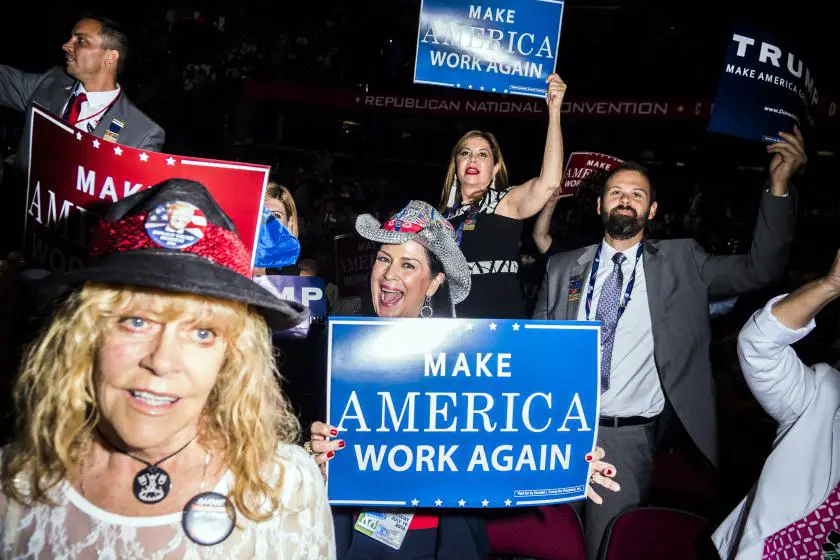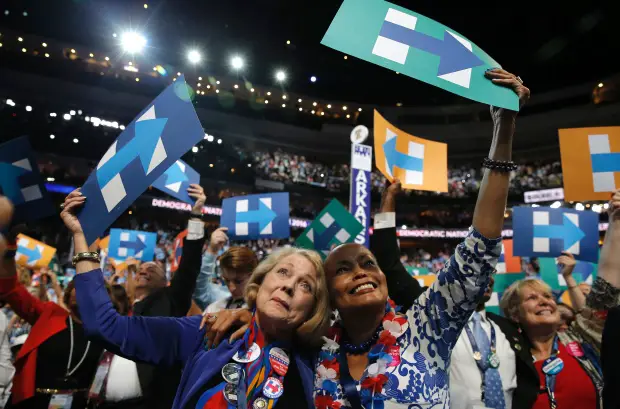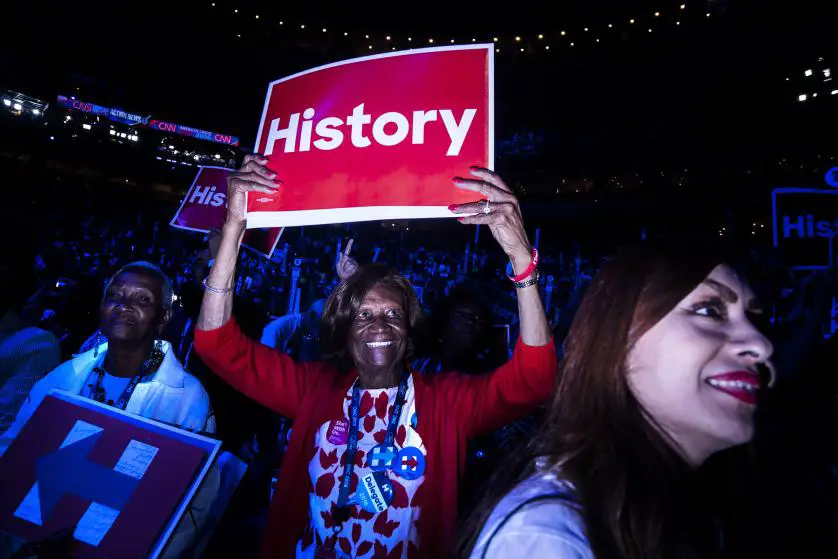The Difference Between the Republican and Democratic National Conventions
One is looking forward; one is looking back.
By Yasser Ali Nasser, Oxford College
So, it’s been a pretty terrible year for American politics.
If you’re a political junkie like me, you’ll probably have been watching in horror as a pompous bully mopped the floor with the rest of the Republican candidates on one side, while on the other one candidate kept messing up what by all accounts should have essentially been a coronation, failing to present a likeable image and mustering real grassroots support amongst the Democratic base.
Translation: This election season is fucked up.

Donald Trump called for a ban on all Muslims entering the United States, referred to Mexican immigrants as rapists and criminals and said that he believed John McCain—a man who, while I dislike his politics, I can definitely say I admire for his courage—was a loser. And this was all before voting in the primaries even started. And yet he still managed to clinch his nomination with relative ease. So what did the GOP convention look like under his leadership? Surely he was just saying some outrageous things to rile up the base before pivoting to the center now that he has the nomination, right?
Well, no, not really. The GOP convention seemed to up the ante by practically screaming for Hillary Clinton’s criminal indictment and/or her execution. People accused her of being a crook, of being affiliated with devil-worshippers, etc. There was open revolt against Trump through some NeverTrump delegates, as well as Cruz, for once, actually doing the right thing and refusing to offer his endorsement.
Amidst all that chaos, one thing really stood out. The GOP’s message, as presented by this convention, was not a positive one. America is being lost, they said, America is falling behind, America is doomed. And who would be America’s grand savior, its messianic champion? Well, Donald Trump, of course. Trump and his family offered very little in terms of actual policy or substantive strategies to cure America’s supposed ailments. Instead, Trump decreed: “Nobody knows the system better than me, which is why I alone can fix it.” He alone would lead America back to its greatness, to its supposed past glories.
And that’s just it. The GOP’s convention did not look toward the future for hope. It looked toward the past, ignoring America’s former mistakes and mythologizing the pre-Obama era as some sort of golden age. Look, I’m not a fan of the GOP, but I can’t deny that some politicians on their side (Rubio comes to mind) have been trying to pivot toward presenting an alternative vision of the future vis-à-vis the Democrats, as opposed to trying to resurrect some forgotten bygone age.
That is a positive message; it’s not the one that we saw last week.
So what about the DNC? Did Hillary Clinton manage to screw everything up again? Early on in the week, it certainly looked like that was the case. Firstly, there were the Committee email leaks, and while nothing major seemed to be revealed, the leaks certainly confirmed that the Party organization was not even remotely “neutral” during the primaries and had been against Senator Bernie Sanders from the beginning. Couple that with the fact there was some pretty nefarious shenanigans surrounding the leaks themselves, it does seem like the Democrats were being sabotaged before the convention could go underway.
Then there was Clinton’s VP pick. It was, as expected, Tim Kaine. The media seemed to hail this as a sensible choice, but a lot of progressives were outraged. Clinton had, it seemed, been slowly inching to the left, giving way to many of Sanders’ grievances, like superdelegates and breaking up the big banks on Wall Street. But, then she picked someone who falls on the Democratic Party’s right flank. She had options like Tom Perez and Elizabeth Warren—people that would’ve served as an olive branch to the progressive wing of the party that felt shunned and betrayed by the Democratic National Committee’s condescension—and went with Vanilla Ice.
But Sanders played the role of the gracious loser. Instead of spiting Hillary Clinton in the same way that Cruz had done to Trump, he got on stage on Monday night and gave a raucous speech in support of Clinton, much to the dismay of some of his more vociferous followers. Those same followers tried to boo and kick up a fuss, but, regardless of the media’s focus on that supposed “disunity,” the Convention seems to have progressed rather well.
So how has it gone?
Like I said, Sanders really helped to properly unite the party, arguing forcefully that “Hillary Clinton must become the next president of the United States. The choice is not even close.”
He was immediately followed by Michelle Obama, whose speech labelled Clinton as the “only person who I trust” with the responsibility of being President.
The speech was so good that the press immediately called for her to run for office. Tuesday was perhaps not quite as electrifying, but still featured a fantastic speech by the Mothers of the Movement before bringing out Bill Clinton to gush about his wife for a solid half an hour.
But it was Wednesday night, I think, that really sold me.
Look, I’m well to the left of mainstream American politics. I voted for Bernie Sanders. I support Hillary Clinton now (and, unlike many other skeptics, I think she’ll actually be a decent President) but my support for her has been mostly motivated by a massive fear of Trump and what he represents. I’m very much playing the lesser of two evils game here. So far, while I’ve had some faith that Clinton would prove to be pretty liberal in office itself, I’ve not been very impressed with the campaign she’s been running, and have gotten pretty scared by her abysmal performance in the polls.
But then I heard President Obama’s speech. And it was in that speech that the biggest difference between the RNC and the DNC was laid out: The vision for what America is, and what America ought to be.
 Some people have often accused the Democrats and Obama of being out of touch with Americans when they proclaim that America is great and that we shouldn’t feel so scared and uneasy. I think that is justified, to some extent. But in Obama’s speech, he laid out I think a pretty important distinction. Progress has been made, but not enough. “We’re not done perfecting our union,” he said, and he’s right. But Obama made it clear that we can perfect our union. He made it clear the future can be full of hope and change, so long as we wanted it to be.
Some people have often accused the Democrats and Obama of being out of touch with Americans when they proclaim that America is great and that we shouldn’t feel so scared and uneasy. I think that is justified, to some extent. But in Obama’s speech, he laid out I think a pretty important distinction. Progress has been made, but not enough. “We’re not done perfecting our union,” he said, and he’s right. But Obama made it clear that we can perfect our union. He made it clear the future can be full of hope and change, so long as we wanted it to be.
The Republicans proclaimed doom, and the Democrats, yet again, proclaimed hope.
Obama made it clear that Hillary stands for the ideals of a fairer, more perfect union. And most importantly, he took the Republican nominee down a few pegs, calling Trump out on his ego. This culminated in what was probably the most memorable line of the night: “We don’t look to be ruled.”
Donald Trump claims that he alone can prevent the great calamities on the horizon, whereas Clinton and the Democrats inisisted that we must stand strong against challenges and meet them with hope, with courage and with typical American optimism. The RNC was about attacking and savaging Clinton and Obama. The DNC was about challenging us to reach for a better America.
I still have my doubts about Clinton, and about the Democrats in general. And I’m still afraid that they’ll fail against Trump’s unpredictability. But I think I’ll rest somewhat easier knowing that the party I support has not given way to the fear and anxiety that has washed over the country, and is willing to actually provide a real, alternative vision for the future.

















